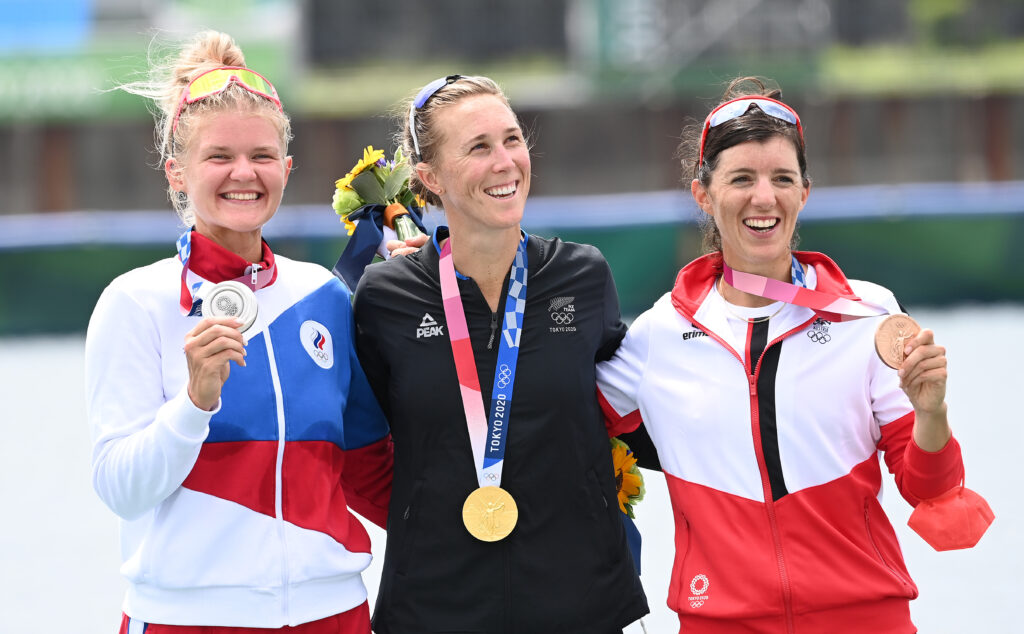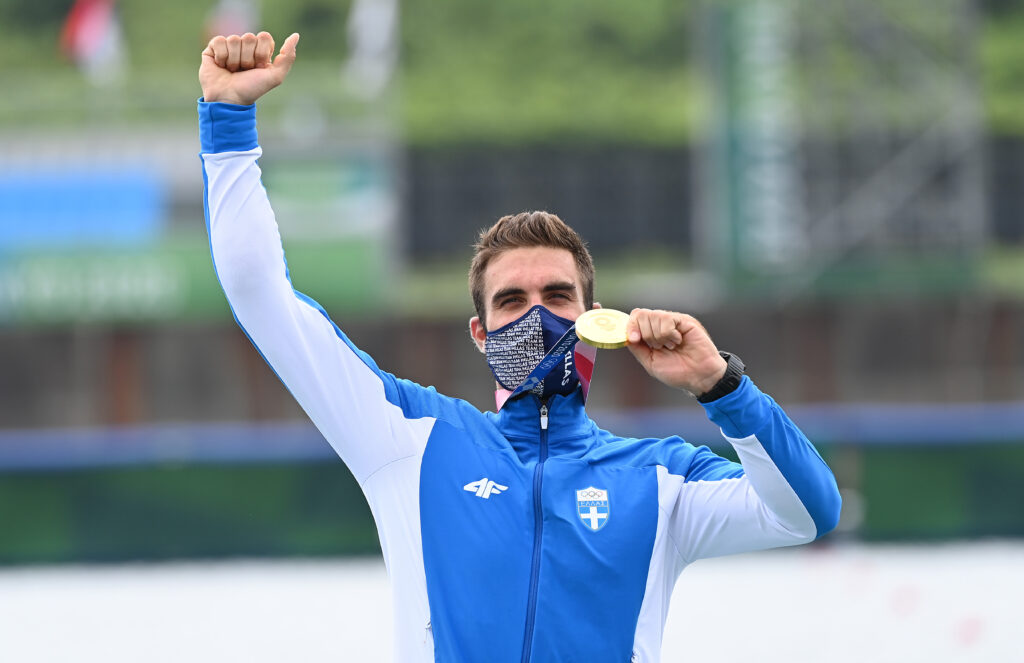
30 Jul 2021
Blue riband eights and singles finale at the Tokyo Olympic Rowing Regatta
The best rowers in the world from the smallest and biggest boats showed what it’s all about on the final day of racing at the Tokyo Olympic Rowing Regatta. The Sea Forest Waterway had some of the best conditions of the week with just a small ripple on the water and a small cross tail wind to help push the rowers to fast times.
With cloudy skies temperatures were a little cooler starting out at 27 degrees Celsius.
Women’s single sculls (W1x) – Final
Until today New Zealand’s Emma Twigg and Hanna Prakatsen of ROC had not raced each other. This is Twigg’s first regatta since 2019 and Prakatsen has only just come into the single after mainly rowing for Belarus in the women’s quadruple sculls. Prakatsen qualified for the Olympics through the Final Olympic Qualification Regatta in May and so has had to peak again for today. At the start all was quiet for this much anticipated final.
China and Switzerland rated high at the start. Jeannine Gmelin of Switzerland is a former World Champion and had a great semifinal to get to the race today. European Champion Magdalena Lobnig of Austria was the fastest starter with Twigg moving with Lobnig. The Austrian is a fast starter, Twigg is not so much, but Twigg still had the lead. China’s Yan Jiang followed in third. As Twigg moved out to a full boat length lead the rest of the field was very, very close. Now Prakatsen began to move and had pulled through to second. Lobnig was holding on. Twigg now had an open water lead, but she knew that Prakatsen had a huge sprint and must have wanted to make her mark early in.
It was the last quarter of the race and Twigg still had the lead as Prakatsen started to come. Prakatsen was leaving Lobnig behind as Jiang and Victoria Thornley of Great Britain charged for the lesser medals. The race was on for bronze. Lobnig was having the race of her life. Prakatsen couldn’t catch Twigg. Twigg had done it. At her fourth Olympic Games and the last two finishing fourth, Twigg was the Olympic Champion. Prakatsen was in tears. She’d given it her all. Lobnig, never a World Champion was the bronze medallist. Twigg had set a new Olympic Best Time of 7:13.97.
Results: NZL, ROC, AUT, GBR, SUI, CHN

B-final
A five-boat race got underway after World Champion Sanita Puspure of Ireland pulled out for medical reasons. Instead it was 2019 World Championship bronze-medallist Kara Kohler of the United States the boat to watch out for. But also 2019 Worlds finalist Carling Zeeman of Canada who has had excellent results in recent years. But it was Sophie Souwer of the Netherlands who led at the first 500m mark. Up there at the start was also Kohler and star of this rowing regatta Nazanin Malaei of Iran. At 171cm Malaei was told she was too short for rowing. Malaei has proved this not to be the case. Where was Zeeman?
Souwer continued to lead through the middle of the race with Kohler in close second. Souwer plans to retire after these Olympics to pursue her career in midwifery. Zeeman then did a push and got into third. Souwer was at 37 and had earned an open water lead as Zeeman began to charge. Zeeman was catching Kohler. Souwer had earned seventh in the world with Zeeman grabbing eighth in a photo finish with Kohler at the line.
Results: NED, CAN, USA, GRE, IRI (IRL did not start)
Men’s single sculls (M1x) – Final
It was all go in the men’s single final with a hot line up and without Oliver Zeidler in the mix, this could go any direction. Kjetil Borch of Norway shot out quickly followed by fellow Scandinavian, Sverri Nielsen of Denmark. These are the two favourites for today with Borch and Nielsen regular medallists in the last quadrennial. They know each other well and that must have come into their race plan for today. Greece followed in third. The Greek sculler Stefanos Ntouskos is a great sprinter and at 24 years old is one of the juniors of single sculling. Ntouskos then took the lead in a huge push. What a push! Could Ntouskos hold this pace?
Then Nielsen decided enough was enough and came back on Ntouskos with Borch going with Nielsen. In fourth Damir Martin of Croatia was picking up the pace. Just 500m were left to row and Nielsen was coming back on Ntouskos. Borch was at 38 and holding on as Martin kept on coming. Ntouskos continued to drive and had held off the Nielsen pace. Wow, Ntouskos! Borch had now got his bow ball ahead of Nielsen.
Ntouskos was at 41 and was holding off the best in the world. Glory for Greece. Borch in silver and a photo finish for Nielsen and Martin. Ntouskos had set a new Olympic Best Time of 6:40.45. Nielsen and Martin waited. Martin had done it. The very happy Martin has had a rocky quadrennial leading to this final and after taking silver at the Rio Olympics, this is a fabulous result for Martin.
Results: GRE, NOR, CRO, DEN, ROC, LTU

B-final
When you have the World Champion lined up in a B-final you know it’s the Olympics. Oliver Zeidler of Germany took off at a lightening pace getting to the first 500m in just 1:37. Zeidler, who turned 24 a couple of days ago, comes from a rowing family and will have many more Olympics in him. Zeidler remained in the lead with Italy’s Di Mauro, 19, keeping Zeidler in check with Trevor Jones of Canada in third. Jones, 23, is also young and is the two-time under-23 World Champion. But what about Japan’s Arakawa. He was in a solid fourth.
Gennaro Di Mauro was doing great and had closed on Zeidler. Jones hung in there with Arakawa remaining in fourth. Zeidler then took up his stroke rate and moved away from Di Mauro with Jones in third. Zeidler did not look happy at the finish. Di Mauro looked satisfied.
These rowers are the future of world single sculling.
Results: GER, ITA, CAN, HUN, JPN, BRA
Women’s eight (W8+) – Final
This boat class starts off with seven qualified boats. One has been knocked off. Six were left to go for gold. The green light had gone. The New Zealanders were the World Champions but hadn’t raced internationally since 2019. The United States were the Olympic Champions and had an amazing Olympic run of wins. But at the start it was Canada in the lead. They were going quicker than in their heats. Australia and New Zealand were neck and neck with China in fourth.
Canada also hadn’t raced internationally since 2019 when they finished fourth at the world champs. Canada continued to lead with Australia getting a fraction in front of New Zealand. Margins remained close but Canada still looked the best. New Zealand moved into a piece and tried to get the Canadians. In the final sprint just three seconds separated the top five boats with China really going for it. China looked like they had the best sprint. There was just 200m left to row and Canada still had the lead and held off New Zealand. Canada had won their first gold in the eight since 1992. Canada’s coxswain Kristin Kit was standing up. The happiest in the boat. New Zealand’s Prendergast and Gowler had their second medal of this regatta. China had medalled in the eight for the first time at the Olympics.
Results: CAN, NZL, CHN, USA, AUS, ROU
Men’s eight (M8+) – Final
The tension leading up to this final, the final final of the Tokyo Olympic rowing regatta, was intense. Down to the last six boats Germany and the Netherlands had qualified through the heats with all other boats making it to the final through the repechage. The line up was the United States, New Zealand, Germany, the Netherlands, Great Britain and Australia. The British and Germany have had the most success in recent years with Great Britain the reigning Olympic Champions and Germany the 2017, 2018 and 2019 World Champions.
Fifty-four bodies got off the line with Germany having the quickest start, and the United States was also quick. The Germans looked great as they kept their nose ahead of Great Britain at the first 500m mark. They went under the 700m bridge and the New Zealanders had moved into a piece and moved at the fastest speed. Germany had a tiny margin with New Zealand up on Great Britain. At the half way point there was noting in it. Just a second separated the top four boats with the United State right there. Only Australia and the Netherlands were down a bit.
The Kiwis had taken half a length lead as they kept the speed on. The last 500m mark had already arrived and New Zealand had the edge over Great Britain in second and Germany in third. Great Britain now charged. There was 300m left to row. The New Zealanders went again at a 41 stroke rate. The US were at 43 and Germany was still there. New Zealand looked like they had it as Great Britain and Germany went for a photo finish. Germany had just pipped the British. What a race. MacIntosh, Bond, Murray, Brake, Williamson, Wilson, Kirkham, MacDonald and coxswain Sam Bosworth are Olympic Champions. Hamish Bond had picked up his third Olympic gold – 2012, 2016 and 2020.
Results: NZL, GER, GBR, USA, NED, AUS

